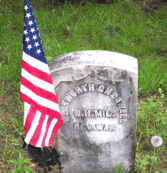Wentworth Cheswell was the grandson of black slave, Richard Cheswell, who gained his freedom in 1717 and became the first black man to be a property owner in New Hampshire. Wentworth’s father was a house wright who was distinguished for building the homes of several of the patriot leaders, including John Paul Jones and the Rev. Samuel Langdon.
 In 1763, Wentworth attended the Dummer Academy, which was located thirty miles away from his home of Newmarket in Byfield, Massachusetts. In the colonial era, few people were formally educated due to cost and the lack of inexpensive public schooling. However, his father’s financial status allowed him to guarantee Wentworth the finest education available at the time. During Wentworth’s education he studied reading, writing, and arithmetic, Latin, Greek, swimming, and horsemanship.
In 1763, Wentworth attended the Dummer Academy, which was located thirty miles away from his home of Newmarket in Byfield, Massachusetts. In the colonial era, few people were formally educated due to cost and the lack of inexpensive public schooling. However, his father’s financial status allowed him to guarantee Wentworth the finest education available at the time. During Wentworth’s education he studied reading, writing, and arithmetic, Latin, Greek, swimming, and horsemanship.
Upon returning home in 1767, Wentworth Cheswell became a schoolmaster and married Mary Davis of Durham, New Hampshire. They were later blessed with four sons and nine daughters. By that time, he also was a landowner and unfaltering member of the local church, where he held a church pew. His achievements for anyone at the age of twenty-one were impressive. But for an African American, it was almost unheard of.
In 1768, Wentworth was elected town constable, the first of many offices he would hold throughout his life. Cheswell was also one of the five men elected to oversee the schools, becoming one of Newmarket’s first school board members. In 1770, he was elected town selectman. The position of town selectman was recognized as a head of local government and was annually chosen in the town. Selectmen were referred to as town fathers, a name which expressed their prudent and discretionary character to the citizens.
In April 1776, Wentworth signed a document in which he pledged, at the risk of life and fortune, to take up arms to resist the British. Signatures of people were obtained to oppose the antagonistic actions of the British fleets and armies. The wealth of the signatures gave the signers of the Declaration of Independence assurance that their acts would be sanctioned by the country.
Like Paul Revere, he made an all-night ride back from Boston to warn his community of the impending British invasion. With the imminent arrival of the British frigate Scarborough and the sloop of war Canseau, Portsmouth asked for help from their neighboring communities. Newmarket held a town meeting, where it was decided that thirty men would be sent to Portsmouth to help. Cheswell made the ride to Exeter, receiving instructions from the committee on where the men of Newmarket were to be.
In 1777, Cheswell enlisted under Colonel John Langdon in a select company called “Langdon’s Company,” which helped to bolster the Continental Army at the Saratoga campaign. Langdon’s company of Light Horse Volunteers made the 250-mile march to Saratoga, New York, to join with the Continental Army under General Horatio Gates, defeating British General Burgoyne at the Battle of Saratoga, which was the first major American victory in the Revolution. Cheswell’s only military service ended October 31, 1777. As with many other men, he served for only a limited time, as his family was dependent on him for support.
After the Revolutionary War, Cheswell was named the first archeologist in the state New Hampshire for his work in copying town records from 1727, chronicling of older stories of the Newmarket, and keeping lists of the town’s events. A town history compiled by Cheswell can be found at the Dimond Library Special Collections Department at University of New Hampshire. The Rev. Jeremy Belknap, author and compiler of the three-volume “History of New Hampshire (1784-1792),” acknowledged that much of the information he gleaned came from Wentworth. In 1801, Cheswell and other men established the Newmarket Social Library, the first library in that township. Cheswell’s estate was valued the highest of that philanthropic party, at over $13,000.
Wentworth Cheswell died from typhus fever on March 8, 1817. He had, for seventy years, been a vital and influential member of the community of Newmarket, New Hampshire. In his will he stated, “I also order and direct that my Library and collection of Manuscripts be kept safe and together…if any should desire the use of any of the books and give caution to return the same again in reasonable time, they may be lent out to them, provided that only one book be out of said Library in the hands of any one at the same time.”
Wentworth Cheswell was a founding father of our Union, but he was also loved father and husband, town leader, patriot, church leader, schoolmaster, judge, archeologist, veteran, and Christian.
©2011 Off the Grid News